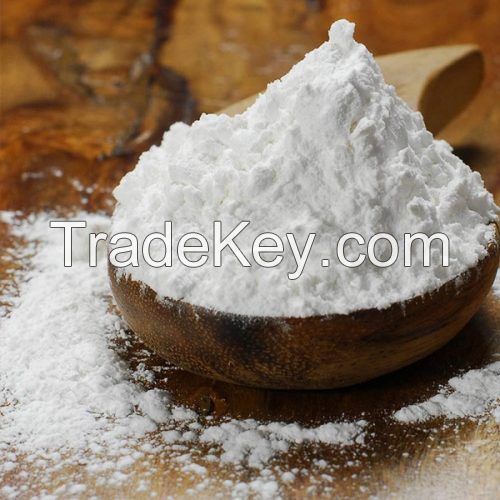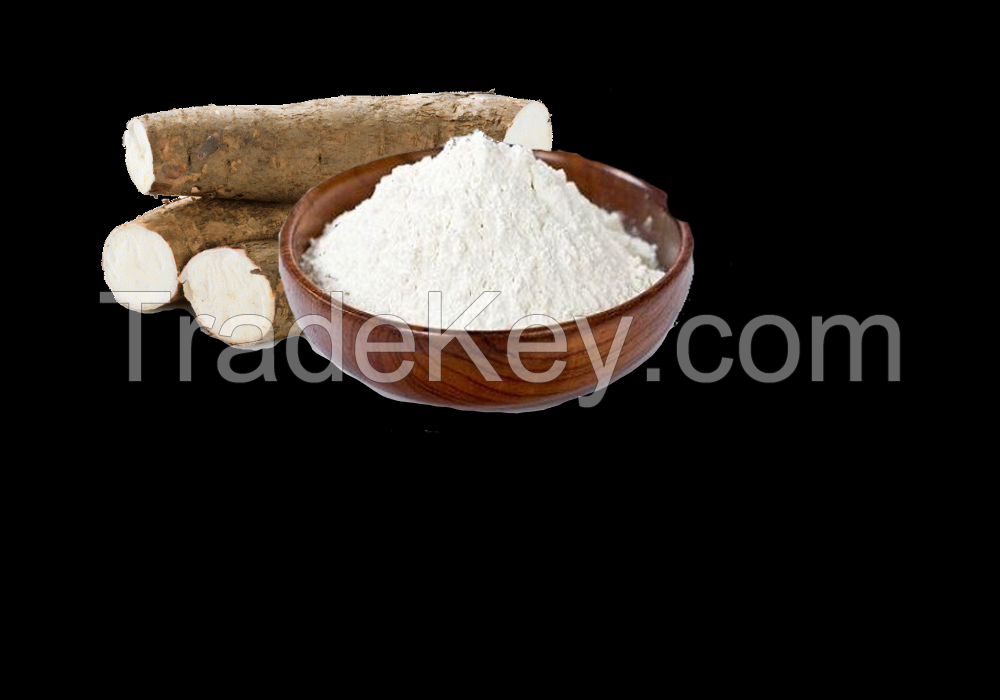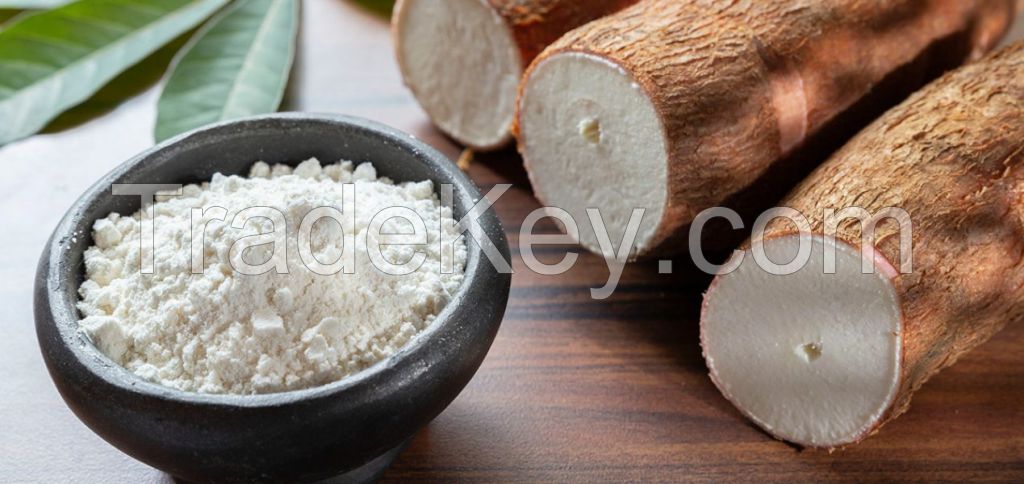





FOB Price
Get Latest Price0.5 ~ 2 USD / Kilogram ( Negotiable )
|1000 Kilogram Minimum Order
Country:
Vietnam
Model No:
Jade Tapioca starch - +84 363378708 - A184
FOB Price:
0.5 ~ 2 USD / Kilogram ( Negotiable ) Get Latest Price
Place of Origin:
Vietnam
Price for Minimum Order:
0.5 per Kilogram
Minimum Order Quantity:
1000 Kilogram
Packaging Detail:
As Customer's Request
Delivery Time:
15 days
Supplying Ability:
10000 Kilogram per Month
Payment Type:
T/T, L/C, Western Union
Product Group :
Tapioca Starch: A Versatile Ingredient with Endless
Possibilities
Tapioca starch, derived from the cassava root, is a versatile
and essential ingredient in both the culinary and non-culinary
worlds. Known for its fine texture, neutral flavor, and
thickening properties, tapioca starch has become a kitchen
staple that offers countless applications. Whether youre
preparing gluten-free recipes, experimenting with new textures
in your dishes, or looking for a natural and sustainable
product, tapioca starch is a must-have pantry item.
A Culinary Powerhouse: Essential for Cooking and
Baking
Tapioca starch is an invaluable ingredient in a wide variety of
recipes, thanks to its ability to thicken, bind, and improve
texture. It is especially popular in gluten-free cooking, where
it helps to create chewy, light textures in baked goods like
bread, cookies, and cakes. Tapioca starchs ability to hold
moisture also ensures these treats remain soft and fresh for
longer.
In savory dishes, tapioca starch serves as a great thickener for soups, sauces, gravies, and stews. It creates a smooth and glossy finish, enhancing the overall visual appeal and mouthfeel of dishes. In addition, it is a key component in many Asian dishes, such as bubble tea (boba), dumplings, and certain stir-fries, where its unique consistency contributes to the dishs signature texture.
Textural Innovation in Cooking
One of the standout features of tapioca starch is its ability
to create unique textures. When mixed with water and heated, it
forms a gel-like consistency that can be used in various
applications. This gelatinous quality is ideal for making
gluten-free puddings, custards, or jellies, where a smooth and
soft texture is desired.
In addition to its thickening abilities, tapioca starch is frequently used as a binding agent in gluten-free recipes or as a coating for frying. It forms a crispy, light, and crunchy exterior that adds a delightful contrast to the soft, tender interior of fried foods.
Nutritional Benefits of Tapioca Starch
While tapioca starch is primarily valued for its functional
properties, it also offers certain nutritional benefits. It is
naturally gluten-free, making it an excellent alternative for
those with gluten sensitivities or celiac disease. Tapioca
starch is low in fat and contains no cholesterol, making it a
heart-healthy option for various dishes.
Tapioca starch is a rich source of carbohydrates, providing a quick energy boost, and is also a good source of essential minerals like iron, which is important for maintaining healthy blood cells. Though not particularly high in fiber, tapioca starch does contribute to digestibility, offering a smooth and easy-to-digest ingredient for those with sensitive stomachs.
Sustainable and Eco-Friendly Ingredient
Tapioca starch is not just a functional food; it is also an
eco-friendly product that supports sustainability. The cassava
plant, from which tapioca starch is extracted, is hardy and
grows well in tropical climates, requiring less water and fewer
pesticides compared to other crops. This makes it a more
sustainable crop compared to other starch sources like corn or
wheat.
The production of tapioca starch involves minimal processing, which ensures that it maintains its natural properties while reducing environmental impact. By using the cassava root, a plant that thrives in regions with poor soil quality, tapioca starch offers an opportunity for sustainable farming practices that reduce food waste and promote responsible land use.
A Staple in Global Cuisines
Tapioca starch is a key ingredient in many traditional dishes
across the globe. In South America, it is used to create
tapioca pancakes, while in Southeast Asia, it forms the base
for boba pearls in bubble tea. In Africa, it is often included
in fufu, a starchy dish eaten with stews and soups. Its ability
to absorb flavors and its versatile texture make it a popular
choice in cuisines from the Caribbean to Asia.
In Western kitchens, tapioca starch is embraced for its gluten-free properties and its ability to create delicate, soft textures in baking. It has found a place in a variety of modern plant-based and vegan dishes, where it serves as a binder and thickener without the need for animal-based ingredients.
Practical Tips for Using Tapioca Starch
Tapioca starch is incredibly easy to incorporate into recipes,
though a few key tips can help ensure the best results. To use
tapioca starch as a thickener, simply dissolve it in a small
amount of cold water before adding it to your hot liquids. This
prevents clumping and allows the starch to work its thickening
magic without disrupting the smooth consistency of your dish.
For baking, tapioca starch is often combined with other gluten-free flours like rice flour or almond flour to create well-balanced textures. It is important to store tapioca starch in a cool, dry place, away from moisture, to preserve its quality and shelf life.
Beyond the Kitchen: Non-Culinary Uses of Tapioca
Starch
Tapioca starch is also useful outside of the kitchen. In
personal care products, it is a popular ingredient in body
powders, dry shampoos, and deodorants due to its
moisture-absorbing properties. It is also used in the textile
industry for starching fabrics and in pharmaceuticals for
tablet production.
In arts and crafts, tapioca starch can be used to make paste for paper mache or other craft projects. Its sticky consistency makes it ideal for binding materials together in non-food applications, showcasing its versatility across various industries.
Conclusion
Tapioca starch is much more than just a pantry staple—its
versatility, sustainability, and nutritional benefits make it
an invaluable ingredient in both cooking and beyond. Whether
used to create chewy baked goods, thicken sauces, or craft
unique textures, tapioca starch offers endless possibilities
for culinary innovation. Its natural, gluten-free properties
make it a valuable addition to a variety of recipes, while its
eco-friendly production practices make it a responsible choice
for conscious consumers. With tapioca starch in your pantry,
you have an ingredient that bridges functionality, flavor, and
sustainability, making it an essential item for any modern
kitchen.
| Country: | Vietnam |
| Model No: | Jade Tapioca starch - +84 363378708 - A184 |
| FOB Price: | 0.5 ~ 2 / Kilogram ( Negotiable ) Get Latest Price |
| Place of Origin: | Vietnam |
| Price for Minimum Order: | 0.5 per Kilogram |
| Minimum Order Quantity: | 1000 Kilogram |
| Packaging Detail: | As Customer's Request |
| Delivery Time: | 15 days |
| Supplying Ability: | 10000 Kilogram per Month |
| Payment Type: | T/T, L/C, Western Union |
| Product Group : | starch |




